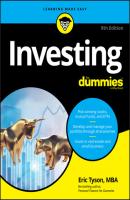Investing For Dummies. Eric Tyson
Чтение книги онлайн.

Читать онлайн книгу Investing For Dummies - Eric Tyson страница 14
Название: Investing For Dummies
Автор: Eric Tyson
Издательство: John Wiley & Sons Limited
Жанр: Личные финансы
isbn: 9781119716518
isbn:
Another reason people keep too much money in traditional bank accounts is that the local bank branch office or online bank makes the cash seem more accessible. Money market mutual funds, however, offer many quick ways to get your cash. Most money market mutual funds can be accessed online, just like most bank accounts. You can also write a check (most funds stipulate the check must be for at least $250), or you can call the fund and request that it mail or electronically transfer your money.
Steering Clear of Futures and Options
Suppose you think that IBM’s stock is a good investment. The direction that the management team is taking impresses you, and you like the products and services that the company offers. Profits seem to be on a positive trend. Things are looking up.
You can go out and buy the stock. Suppose that it’s currently trading at around $100 per share. If the price rises to $150 in the next six months, you’ve made yourself a 50 percent profit ($150 – $100 = $50) on your original $100 investment. (Of course, you will incur some brokerage fees to buy and then sell the stock.)
But instead of buying the stock outright, you can buy what are known as call options on IBM. A call option gives you the right to buy shares of IBM under specified terms from the person who sells you the call option. You may be able to purchase a call option that allows you to exercise your right to buy IBM stock at, say, $120 per share in the next six months. For this privilege, you may pay $6 per share to the seller of that option (and you’ll also pay trading commissions).
If IBM’s stock price skyrockets to, say, $150 in the next few months, the value of your options that allow you to buy the stock at $120 will be worth a lot — at least $30. You can then simply sell your options, which you bought for $6 in the example, at a huge profit — you’ve multiplied your money five-fold!
You could easily lose your entire investment. If a company’s stock price goes nowhere or rises only a little during the six-month period when you hold the call option, the option expires as worthless, and you lose all — that is, 100 percent — of your investment. In fact, in my example, if IBM’s stock trades at $120 or less at the time the option expires, the option is worthless.
A call option represents a short-term gamble on a company’s stock price, not an investment in the company itself. In my example, IBM could expand its business and profits greatly in the years and decades ahead, but the value of the call option hinges on the ups and downs of IBM’s stock price over a relatively short period of time (the next six months). If the stock market happens to dip in the next six months, IBM may get pulled down as well, despite the company’s improving financial health.
Passing Up Precious Metals
Over the millennia, gold and silver have served as mediums of exchange or currency because they have some intrinsic value and can’t be debased the way paper currencies can (by printing more money). These precious metals are used in jewelry and manufacturing.
As investments, gold and silver perform well during bouts of inflation. For example, from 1972 to 1980, when inflation zoomed into the double-digit range in the United States and stocks and bonds went into the tank, gold and silver prices skyrocketed more than 500 percent. With precious metals pricing zooming upward in the decade that began in 2000, some feared the return of inflation.
Getting Clobbered in Currencies and Cryptocurrencies
From time to time, you may see some ads or articles touting investing in currencies such as the British pound, Swiss franc, Japanese yen, and so on. Because such currencies have the backing of their particular country’s government, they are usually somewhat stable unless the country has a problematic economic situation (really high inflation) or troublesome finances (extremely high levels of government debt that will make repayment difficult).